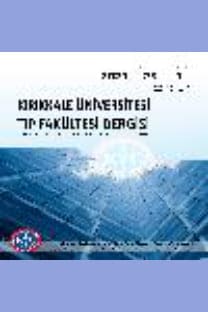0-2 Yaş Grubu Bebeklerin Anne Sütü ile Beslenme Durumları ve Etkileyen Faktörler
Pages 15-20
Breastfeeding, formula, Kırıkkale,
___
- Coşkun T. Anne sütü ile beslenme. Katkı Pediatri Dergisi. 2003; 2: 168-83.
- Curran JS, Barness LA. Nutricion. In: Berman RE, Kliegman RM, Jenson HB (eds). Nelson Text Book of Pediatrics. 16th edition. Philadelphia: W.B. Saunders Company; 2000; p. 150-4
- Infant and young child feding. A tool for assessing national practices, policies and programmes. WHO 2003 http://www.who.int/child-adolescenthealth/NewPublications/Nutrition/icyf.pdf.
- Complemantary feeding report of the global consultation. Summary of guiding principles. WHO Geneva, 10-13 December 2001 http://www.who.int/child-adolescenthealth/NewPublications/Nutrition/Complemantary-Feeding.pdf
- Innocenti Declaration on the protection, promotion and support of breastfeeding. WHO/UNICEF.1990. http://www.unicef.org/programme/breastfeeding/in nocenti.htm
- Jones G, Steketee RW, Black RE, Bhutta AZ, Morris SS. How many child deaths can we prevent this year? Lancet. 2003; 362: 65-71.
- Hacettepe Üniversitesi Nüfus Etütleri Enstitüsü (2009) Türkiye Nüfus ve Sağlık Araştırması, 2008. Hacettepe Üniversitesi Nüfus Etütleri Enstitüsü, Sağlık Bakanlığı Ana Çocuk Sağlığı ve Aile Planlaması Genel Müdürlüğü. Başbakanlık Devlet Planlama Teşkilat Müsteşarlığı ve TÜBİTAK, Ankara, Türkiye
- Righard L, Alade MO. Effect of delivery room routines on success of first breastfeed. Lancet. 1990; 336: 1105- 7.
- Widstrom A-M, Thingström-Paulsson J. The position of the tongue during rooting reflexes elicited in newborn infants before the first suckle. Acta Paediatr. 1993; 82: 281-283.
- DiGrilamo AM, Grummer-Strawn LM, Fein S. Maternity care practices: implications for breastfeeding. Birth. 2001; 28: 94-100.
- Sinusas K, Gagliardi A. Initial management of breastfeeding. Am Fam Physician. 2001; 64: 981988, 991-992.
- Baker EJ, Sanei LC, Franklin N. Early initiation of and exclusive breastfeeding in large-scale community-based programmes in Bolivia and Madagascar. J Health Popul Nutr. 2006; 24: 530-9.
- Mullany LC, Katz J, Li YM. Breastfeeding patterns, time to initiation, and mortality risk among newborns in southern Nepal. J Nutr. 2008; 138: 599-603.
- Örün E, Yalçın S.S, Madendağ Y, Üstünyurt-Eras Z, Kutluk Ş, Yurdakök K. Factors associated with breastfeeding initiation time in a Baby-Friendly Hospital. Turk J Pediatr. 2010; 52: 10-16
- Ünalan P, Akgün T, Çiftçili S, Boler İ, Akman M. Why do mother attending a baby-friendly mother and child health care unit start early solid food to their babies. Turk Arch Ped. 2008; 43
- Bağ Ö, Yaprak I, Halıcıoğlu O, Parlak Ö, Harputluoğlu N. Annelerin anne sütü hakkındaki bilgi düzeyi ve emzirmeyi etkileyen psikososyal faktörler. http://www.millipediatri.org.tr/bildiriler/PP0htm Tuncel EK, Dundar C, Canbaz S. Bir üniversite hastanesine başvuran 0-24 aylık çocukların anne sütü ile beslenme durumlarının saptanması. C.U. Hemsirelik Yuksekokulu Dergisi. 2006; 10: 1-6.
- Yiğit EK, Tezcan S. Bebeklerin beslenme alışkanlıkları, çocukların ve annelerin beslenme durumu. Türkiye Nüfus ve Sağlık Araştırması 2003. Hacettepe Üniversitesi Nüfus Etütleri Enstitusu. Ankara, 2003: 141-6.
- Sahin S. Süt çocuğu beslenmesinde ailelerin tutumları, gerisindeki sosyal faktörler ve sonuçlarının irdelenmesi. Okmeydanı Tıp Dergisi. 2003; 20: 34-7.
- Alikaşifoğlu M, Erginöz E, Taşdelen GE. Bir üniversite hastanesine devam eden annelerde tek başına anne sütü verme süresine etki eden faktörler: Turk Ped Arş. 2000; 35: 148-55.
- Bodur S, Yıldız H, Mermer M, Oran B. Konya il merkezinde annenin çalışma durumuna göre emzirme süresi ve ek gıda ile ilgili tutumu. Selçuk Üniversitesi Tıp Fakültesi Dergisi. 2002; 18: 97
- Açık Y, Dinç E, Benli S, Tokdemir M. Elazığ ilinde yaşayan 0-2 yaş grubu çocuğu olan kadınların bebek beslenmesi ve anne sütü konusunda bilgi, tutum ve uygulamaları. Türk Klinik Pediatri. 1999; 8: 53-62.
- Güneş M, Atay G, Şimşek F, Uluyol B, Suskan E, Gülnar S. Anne sütünün yetersiz alımına neden olan faktörler. 47. Milli Pediatri Kongresi, 3. Milli Çocuk Hemşireliği Kongresi Özet Kitabı, İstanbul 2003; 21-23. Yazışma Adresi: Dr. Selda Bülbül
- KÜ Tıp Fakültesi, Çocuk Sağlığı ve Hast. A.D., Sağlam Çocuk Polikliniği Tel: 0318 2252485/2154
- E-posta: seldabulbul@gmail.com
- ISSN: 2148-9645
- Yayın Aralığı: 3
- Başlangıç: 1999
- Yayıncı: KIRIKKALE ÜNİVERSİTESİ KÜTÜPHANE VE DOKÜMANTASYON BAŞKANLIĞI
Bir Meslek Lisesinde Öğle Yemeğine Ulaşmada Zorluk Yaşayan Öğrencilerin Beslenme Alışkanlıkları
Sevil ALBAYRAK, , Cemile ÇELEBİ, Ünzile TAŞKIN, Sinem ŞAŞMAZ, Selami ÇİÇEK
Metaplastik Meme Karsinomu: Olgu Sunumu
Eda ELVERİCİ, , Ayşe Nurdan BARÇA, Mehtap ÇAVUŞOĞLU, Semra DURAN, Levent ARAZ
0-2 Yaş Grubu Bebeklerin Anne Sütü ile Beslenme Durumları ve Etkileyen Faktörler
Selda BÜLBÜL, , Muhammet Fevzi KILINÇKAYA
İdiyopatik Hiperkalsiürik Çocukların Kemik Yoğunluğunun Değerlendirilmesi
, Meryem ÖNDER, Pınar İşık AĞRAŞ, F İnci ARIKAN, Ülper KURT, Yıldız DALLAR
Retrobulber Blok Sonrası Olası Beyin Sapı Anestezisi Gelişen İki Olgu
Premedikasyon için Uygulanan Midazolamdan Sonra Görülen Distoni: Olgu Sunumu
Özden KAMIŞLI, , Handan SOYSAL, Zümrüt DOĞAN, Nihat EKİNCİ, Yusuf TÜRKÖZ
Yatak Yarasına Bağlı Gelişen Ülserde Epidural Analjezi Uygulamaları
